| Listing 1 - 10 of 17 | << page >> |
Sort by
|

ISBN: 9789004505056 9789004097384 Year: 1994 Publisher: Leiden ; Boston : Brill
Abstract | Keywords | Export | Availability | Bookmark
 Loading...
Loading...Choose an application
- Reference Manager
- EndNote
- RefWorks (Direct export to RefWorks)
The growing demand for concise and factual information about the history and culture of Islam has now been met with the Islamic Desk Reference . This handy one-volume work contains a condensation of the subject-matter of The Encyclopaedia of Islam , the most prestigious and valuable reference work for Islamic studies published this century. In a brief, orderly and intelligible form the Islamic Desk Reference provides thus a unique and valuable quick reference tool for those interested in the religion, the believers and the countries of the Islamic world. All entries in the Islamic Desk Reference are given in English. Thus, names of Arabic origin which in the West were corrupted to another spelling, e.g. Ibn Sina to Avicenna, al-Kuhl to alcohol, are found under the latter term. The Islamic Desk Reference contains maps, diagrams and genealogical tables for easy reference, and illustrations.
Islam --- Islamic civilization --- Dictionaries
Book
ISBN: 1855168014 1855168022 1855168030 Year: 1994 Publisher: Bayrūt : Dār al-Sāqī,
Abstract | Keywords | Export | Availability | Bookmark
 Loading...
Loading...Choose an application
- Reference Manager
- EndNote
- RefWorks (Direct export to RefWorks)
Arabic poetry --- Civilization, Arab. --- Islamic civilization. --- History and criticism.
Book
ISBN: 2228888451 Year: 1994 Volume: 207 Publisher: Paris : Payot & Rivages,
Abstract | Keywords | Export | Availability | Bookmark
 Loading...
Loading...Choose an application
- Reference Manager
- EndNote
- RefWorks (Direct export to RefWorks)
Islam --- Islamic civilization --- Civilisation islamique --- History --- History. --- Histoire --- Islamic Empire --- Empire islamique
Periodical
Year: 1994 Publisher: Cambridge, MA : Center for Middle Eastern Studies, Harvard University,
Abstract | Keywords | Export | Availability | Bookmark
 Loading...
Loading...Choose an application
- Reference Manager
- EndNote
- RefWorks (Direct export to RefWorks)
Islam --- Islamic civilization --- Middle East --- Africa, North --- North Africa. --- Middle East. --- Islamic world.
Book
ISBN: 3825301486 Year: 1994 Publisher: Heidelberg : Winter,
Abstract | Keywords | Export | Availability | Bookmark
 Loading...
Loading...Choose an application
- Reference Manager
- EndNote
- RefWorks (Direct export to RefWorks)
Bears --- -Civilization, Arab --- Arab civilization --- Civilization, Semitic --- Islamic civilization --- Ursidae --- Carnivora --- Miscellanea --- Civilization, Arab. --- Miscellanea. --- Civilization, Arab --- Ours
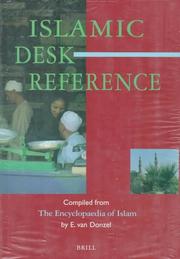
ISBN: 9004097384 9004505059 0585305560 9780585305561 9789004505056 9789004097384 Year: 1994 Publisher: Leiden, The Netherlands ; New York ; Köln : E.J. Brill,
Abstract | Keywords | Export | Availability | Bookmark
 Loading...
Loading...Choose an application
- Reference Manager
- EndNote
- RefWorks (Direct export to RefWorks)
The growing demand for concise and factual information about the history and culture of Islam has now been met with the Islamic Desk Reference . This handy one-volume work contains a condensation of the subject-matter of The Encyclopaedia of Islam , the most prestigious and valuable reference work for Islamic studies published this century. In a brief, orderly and intelligible form the Islamic Desk Reference provides thus a unique and valuable quick reference tool for those interested in the religion, the believers and the countries of the Islamic world. All entries in the Islamic Desk Reference are given in English. Thus, names of Arabic origin which in the West were corrupted to another spelling, e.g. Ibn Sina to Avicenna, al-Kuhl to alcohol, are found under the latter term. The Islamic Desk Reference contains maps, diagrams and genealogical tables for easy reference, and illustrations.
Islam --- History of civilization --- Islamic civilization --- Islamic countries --- 297 <03> --- Islam. Mohammedanisme--Naslagwerken. Referentiewerken --- Dictionaries. --- Dictionaries --- Pays musulmans --- Dictionnaires anglais --- Civilization, Islamic --- Muslim civilization --- Civilization --- Civilization, Arab --- Muslim countries
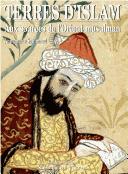
ISBN: 9782804120146 2804120147 2706811188 9782706811180 Year: 1994 Volume: *4 Publisher: Bruxelles: La renaissance du livre,
Abstract | Keywords | Export | Availability | Bookmark
 Loading...
Loading...Choose an application
- Reference Manager
- EndNote
- RefWorks (Direct export to RefWorks)
Islam signifie "s'abandonner à la volonté de Dieu". Celui qui s'en remet à Dieu est un mustim, un musulman. La conviction du musulman de la présence constante de Dieu, de son immanence, modèle profondément sa vie. Ainsi, la profession de foi accompagne chacune de ses actions, chacune de ses pensées. La prière rythme la journée, le Ramadan, l'année. Le pèlerinage à La Mecque est le point d'orgue de la vie du croyant. L'aumône, enfin, est un des cinq piliers de l'Islam. Le Coran en est le véritable centre: la religion révélée par Muhammad, il l'inscrit dans l'histoire et dans le monde. Plus qu'une religion, c'est donc bien une culture entière qu'il faut considérer, tant la première a marqué la seconde de son empreinte. Anne-Marie Schimmel - islamologue de renommée internationale - nous introduit d'abord dans ce qui constitue l'essence de l'Islam, philosophie de vie d'une extraordinaire tolérance si l'on considère l'authentique tradition. S'appuyant sur des sources arabes, persanes, turques et urdu pour les citations et les anecdotes, l'auteur dénoue ensuite, autour d'oeuvres d'art de l'Orient musulman, de manuscrits, de tapis de prière, d'éléments décoratifs d'architecture et de la vie quotidienne, la trame de sept contes qui nous font découvrir l'âme de cette civilisation. Au fil de sept magiques récits "au fil inconstant des jours", construits sur les thèmes de la calligraphie, l'art de la soie, les mœurs dans une couir moghole, les douces rêveries dans la société mamelouke, nous vivons un fascinant parcours dans le temps, du XVIe au XIXe siècle, et dans l'espace, de l'Inde moghole au Caire, en passant par Istanbul. Au-delà de ces époques et des ces pays, c'est la mémoire vive - l'essence et l'âme - de tout un peuple, de plusieurs peuples, qui nous est offerte dans son ineffable grandeur
Evaluation --- Psychometrics --- Educational evaluation --- Psychométrie --- Evaluation en éducation --- Evaluation Evaluatie --- Mesure Maat --- Pédagogie Opvoedkunde --- Psychométrie --- Evaluation en éducation --- Civilisation islamique --- Islamic civilization --- Islam --- History --- Histoire --- History. --- Geschiedenis
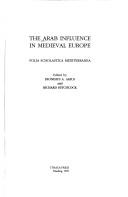
ISBN: 0863721613 Year: 1994 Publisher: Reading : Ithaca press,
Abstract | Keywords | Export | Availability | Bookmark
 Loading...
Loading...Choose an application
- Reference Manager
- EndNote
- RefWorks (Direct export to RefWorks)
Civilization, Islamic --- -Civilization, Medieva --- -Civilization, Medieval --- -Congresses --- Congresses --- Europe --- Civilization --- -Arab influences --- -Congresses. --- Medieval civilization --- Middle Ages --- Chivalry --- Renaissance --- Muslim civilization --- Civilization, Arab --- History --- Council of Europe countries --- Eastern Hemisphere --- Eurasia --- Civilization, Medieval --- Islamic civilization --- Arab influences
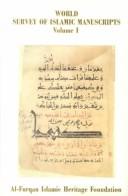
ISBN: 1873992041 9781873992043 1873992009 9781873992005 1873992017 9781873992012 1873992025 9781873992029 1873992033 9781873992036 9781873992043 Year: 1994 Volume: 2, 5, 10-11 Publisher: London: Al-Furqān Islamic heritage foundation,
Abstract | Keywords | Export | Availability | Bookmark
 Loading...
Loading...Choose an application
- Reference Manager
- EndNote
- RefWorks (Direct export to RefWorks)
Islam --- Civilization, Islamic --- Manuscripts --- Library resources --- Directories. --- Catalogs --- Bibliography. --- Sources --- Islamic civilization --- Islamic literature --- Manuscripts, Arabic --- Civilisation musulmane --- Bibliography --- Manuscrits --- Fonds documentaires --- Répertoires --- Catalogues --- Bibliographie --- Islamic countries --- Archival resources --- Directories --- Islam - Manuscripts - Library resources - Directories. --- Civilization, Islamic - Manuscripts - Library resources - Directories. --- Islam - Manuscripts - Catalogs - Bibliography. --- Civilization, Islamic - Sources - Catalogs - Bibliography. --- Islamic literature - Manuscripts - Catalogs --- Manuscripts, Arabic - Bibliography --- Islam - Manuscripts - Library resources - Directories --- Islamic civilization - Sources - Bibliography --- Mss islamiques --- Mohammedaanse landen --- Beschaving [Mohammedaanse ] --- Bronnen --- Catalogi --- Archiefbronnen --- Handschriften --- Documentatiemateriaal --- Adresboeken --- Bibliografie
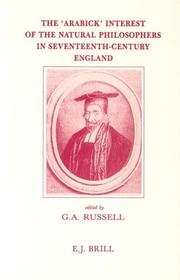
ISSN: 09208607 ISBN: 9004098887 9004247068 9789004098886 9789004247062 Year: 1994 Volume: 47 Publisher: Leiden ;New York E.J. Brill
Abstract | Keywords | Export | Availability | Bookmark
 Loading...
Loading...Choose an application
- Reference Manager
- EndNote
- RefWorks (Direct export to RefWorks)
The medieval concern with Arabic is well established. There was, however, a 'second wave' of Arabic interest in seventeenth-century Europe, which is not widely known. The essays in this volume reveal that, contrary to all expectation, the study of Arabic was pursued by a circle of natural philosophers, philologists and theologians in England in close contact with those on the Continent. Arabic was defended as an aid to biblical exegesis and as the key to a 'treasure house' of ancient knowledge. It led to the founding of Arabic chairs at Oxford and Cambridge Universities, endowed by archbishops and merchants. Arabic was taught, along with Hebrew, at Westminster school. Immense collections of Arabic manuscripts were acquired both privately and by libraries, such as the Bodleian at Oxford. They were sought after by natural philosophers in their research in observational astronomy or in the reconstruction of Greek mathematics. Arabic was also part of the Anglican interest in Eastern Churches. In addition to the earlier elegant editions of the Medici Press at Rome, bi-lingual texts, grammars, lexicons, and histories, were published by trained Arabists. Forgeries emerged based on Arabo-Latin alchemical texts. Arabic was included in the concern with a universal philosophical language. Arabic subjects featured extensively in the correspondence of the Royal Society. The impact of translated texts extended to the Quakers as well as to individual figures, such as Locke. In short, at a time when least expected, Arabic interest permeated all levels of English society, encompassing subjects which ranged from science, religion, and medicine, to typography and importing garden plants. Fourteen historians from different disciplines examine the extent and sources of this phenomenon. Arabic interest is shown to have been a significant aspect of the rise of Protestant intellectual tradition. It was also a major component of University reforms and of secular academic scholarship at Oxford and Cambridge. Thus the period also marks the institutionalisation of Arabic studies. By identifying many unexpected 'Arabick' strands in the complex skein of seventeenth-century English concerns, this volume opens new lines of investigation and challenges some of the accepted historical interpretations of the period.
Civilization, Arab --- Arabic philology --- Arabists --- Study and teaching --- History. --- History --- Great Britain --- Intellectual life --- Civilization --- Arab influences. --- 17th century --- Great Britain - Civilization - Arab influences. --- History of civilization --- Arabian [culture] --- anno 1600-1699 --- England --- Arab countries specialists --- Arabic studies specialists --- Asianists --- Middle East specialists --- Arab civilization --- Civilization, Semitic --- Islamic civilization --- cultuurgeschiedenis --- geschiedenis van de wetenschappen
| Listing 1 - 10 of 17 | << page >> |
Sort by
|

 Search
Search Feedback
Feedback About UniCat
About UniCat  Help
Help News
News